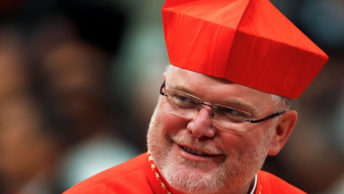A recently passed bill prohibits the distribution of pro-homosexuality information to minors. More specifically, it bans
“the dissemination of information that aims to induce minors to develop non-traditional sexual attitudes, to see non-traditional sexual relationships as attractive, to develop the distorted notion that traditional and non-traditional sexual relationships possess the same value, or the dissemination of information on non-traditional sexual relationships that arouses interest in such relationships.”
Which of our fifty states would you guess took this action?
A generation or two ago “every state” would have been a good guess. Today, however, the number of plausible choices is much more limited. Perhaps Texas, Mississippi, Tennessee, or Utah. Beyond those, it’s hard to think of any.
The correct answer is no state in our country.
The bill was actually passed by the lower house of the Russian parliament, according to Catholic World News. It then received the endorsement of Vladimir Putin and proceeded to the upper house of parliament for approval.
Given Russia’s long domination by atheistic communism, it is ironic that any of its views are more Christian than those in the West, but it is really not surprising. Bishop Fulton Sheen once noted that after decades trapped in the dungeon of unbelief, Soviet peoples had nowhere to go but upward to belief. At the same time, he observed, Western society was sliding into unbelief. Thus, he concluded that in time communist countries might surpass us in faith.
That Sheen’s view may have been prescient is hinted at in the Russian position on homosexuality, as well as in our country’s move in the opposite direction. (This, of course, is not to say that Russia has returned to its Christian faith in the larger sense.)
Over a decade ago Arthur Lipkin wrote Understanding Homosexuality, Changing Schools. According to the publisher, the book provided a foundation in gay/lesbian studies and aimed “to promote the inclusion of gay and lesbian curricula in a range of disciplines” and to make “the gay, lesbian, bisexual, and transgender experience part of a democratic multicultural vision.”
The efforts of Lipkin and other promoters of the homosexual agenda have been successful. Our schools now have “diversity days” that celebrate people’s differences, including different sexual “orientation.” Many also have pro-homosexuality posters on bulletin boards and “Gay and Lesbian Pride Days.” Teachers read books to grade schoolers about children with two moms or dads, and have role-playing sessions in which children are asked to feel what it is like to be rejected because of being gay. Guest speakers are invited to explain why homosexuality is normal and those who speak against it are bigots and homophobes.
In such activities the emphasis is not just on affirming the constitutional rights of homosexuals or the application of the Golden Rule to them as to others, both of which any reasonable or fairminded person would approve. It is not even about giving students information about the various views of homosexuality throughout history and having them compare and evaluate those views. (Such information would include the fact that the American Psychiatric Association viewed homosexuality as a “disorder” until 1973, and would raise the question “what changed to alter the Association’s view?”)
No, the activities of the schools, and of the communications media, are instead about the normalization and celebration of homosexuality.
One question that has not been meaningfully addressed in the national discussion of this issue is whether the promotion of homosexuality in society, particularly among young people, can cause confusion about sexual identity and encourage sexual experimentation. I believe the answer is that it can. After all, the advertising industry has long since established that anything can be “sold” if presented often enough in a favorable context.
A further question: Does early sexual experience affect subsequent patterns of sexual desire, fantasizing, and arousal? If the answer is yes, and I believe it is, then it is not unreasonable to conclude that the promotion of homosexuality in schools and the media and the resulting sexual experimentation will result in many people believing they were “born” homosexual when in fact they were manipulated into that belief.
Even if the number of such mistaken people is small in comparison to the total population, it will represent a decline in the number of individuals who have children in or out of wedlock. And that decline will add to a growing problem in our country. On December 15, 2012, The Economist reported that the U.S. fertility rate has fallen to an all-time low of 1.9, which is below the population replacement rate of 2.1. That means that in the years ahead, as more and more baby boomers retire, there will be fewer and fewer younger people to support the Social Security and Medicare systems.
Here is a thought that is not easy to embrace, but in this case seems appropriate: On the matter of homosexuality, we have a lot to learn from the Russians. And we’d better start learning it.
Copyright © 2013 by Vincent Ryan Ruggiero. All rights reserved









“what changed to alter the Association’s view?”
Why didn’t you ask the APA? For starters, there was the research of Evelyn Hooker… http://www.apa.org/monitor/2011/02/myth-buster.aspx